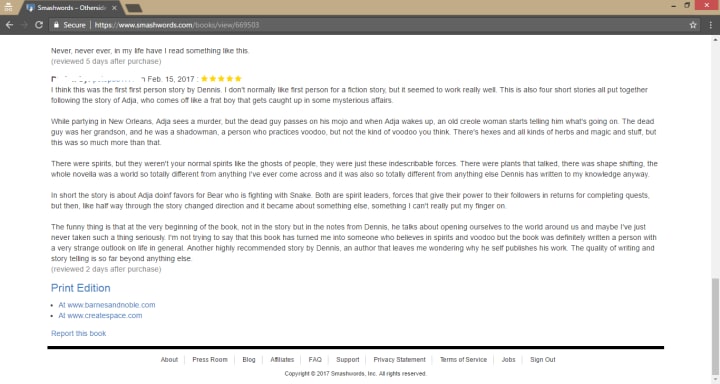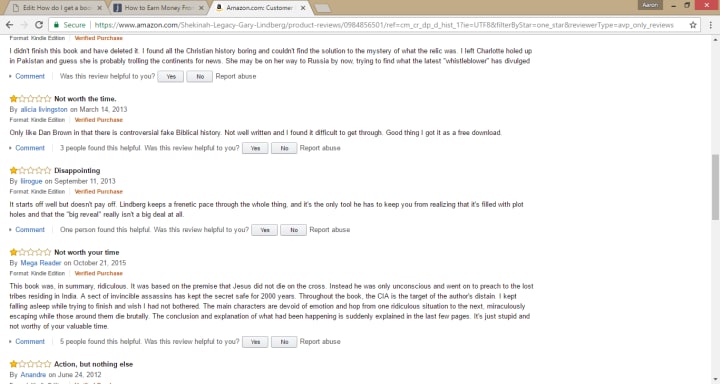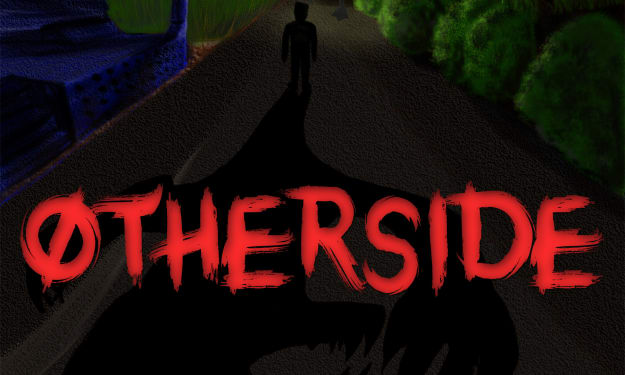How Do I Get a Book Published?
A dissemination of platforms

It’s easier than you think!
First, it’s important to understand that there are various types of publishing platforms, so I’ll outline them, and then disseminate. Ultimately, the choice will be yours, and there’s no reason to stick with one platform throughout the entirety of your career.
Blogging—you can publish your entire novel one chapter at time to your personal blog or to a blogging platform, such as Vocal Media….
POD—Print on Demand publishing has been around for a long time. It’s sometimes called vanity printing, but basically, you can publish anything at all, even a string of random letters, and since you pay the company to print your work in both physical and digital print, all the responsibility falls on you.
Self-publishing—sometimes called indie publishing, but that really isn’t accurate, and I’ll clarify in a moment. Self-publishing is a lot like POD only you do everything. Rather than paying a company to publish, or e-publish, you do it on your own, and usually for minimal cost. Again, everything falls on you, but you have more control than you do with POD.
Indie publishing—this is just traditional publishing, only the press in question is a private press, which usually only has one, or a few, imprints. You might even find your print book in major bookstores, or at least available by order. Indie publishers are supposed to employ cover artists, editors, and marketers in order to sell your books, but some indie publishers are better than others. Some of the bigger indie publishers offer small advances!
Hybrid publishing—this is a sort of combination press, which will usually only publish your work to their site and without physical copies. They may require you to crowdfund your book, and hit a specific dollar goal before they publish, or they may require money upfront, and they end up acting like a digital only POD company without providing any help whatsoever. Avoid at all costs!
Fanfiction/writer sites—there’s not really a name for this kind of publishing. Basically, you can publish your work to sites like Wattpad, Quotev, or FanFiction, and you can add covers, bios, blurbs, and everything else. You’re all alone with this platform, and there’s no way to earn money, but you can get a feel for writing and publishing, and you’ll learn how readers react to your content. There isn’t much more to say than that, so just go peek at some of the more prominent sites by clicking those links in the paragraph.
Traditional publishing—this refers to big name companies like Simon and Shyster, I mean Schuster. They offer advances, they employ editors, cover artists, and marketers, and so long as you present an idea they feel is marketable, you can get a contract, but usually, the acquisitions editors (the people who first peep your story) will only read a story brought to them by a literary agent. Your best bet is to learn how to land an agent.
Let’s tackle blogging first because a ton of writers, would-be novelists, or even published novelists, have overlooked this treasure trove of experience.
Here’s a story about blogging your way to the top as a novelist.
Once, there was a young man who was tired of the crappy fantasy on the market. He decided to write his own fantasy. He posted his work to his personal blog one chapter at a time, and he asked people to take a look at it, and relate their feelings.
After numerous people liked his work, or didn’t like it, he made changes, and re-released his work to his blog—the edited versions of each chapter.
Now, this young man could have also combined all of his chapters into a novel, published through a POD company, like Xlibris, and then sold his book through his blog, but he didn’t do that.
Instead, this young man self published his novel through Amazon’s Kindle program, and sold his fantasy novel for $0.99. It sold so well that a publishing company approached him, and for $100,000, they turned his book into what we now know as Eragon.
Hence, you can publish your entire novel one chapter at time to your personal blog or to a blogging platform, such as Vocal Media, where you don’t need to sell anything because you can get paid per views.
Blogging your novel is a great way to start your writing career.
Now, we’ll tackle POD, and I’ll tell you another story.
Once there was a man who was not quite so young as Mr. Paolini was when he started writing Eragon. He decided to write some short stories, and everybody loved them, but he was internet retarded, and so he just printed his stories out, and gave them away.
One day, one of his fans told him to try to get his stories published. In retrospect, what that young man should have done was tried to get his stories published to e-magazines—another great way to build your writing career—but instead he approached numerous publishers, indie and mainstream, and was picked up by Xlibris.
He did not know Xlibris was a POD company or what a POD company was, but he thought that someone was interested in his work. For a total nearing $10,000, this not quite so young man had a professional cover designed, was forced to self edit (he did not know hiring editors was possible), had a great video book trailer made, and shelled out dollar after dollar for professional reviews, marketing campaigns, and even movie options.
After a year of that mess, and losing all of his money, he canceled his contract with Xlibris, and sent his book to an indie publisher, and that book eventually became Otherside.
The point is that POD companies are both terrific and terrible.
If your book is already professionally edited, and you already have a great number of fans expecting your book, a POD company can really place your book in the hands of hundreds of thousands of people, and their marketing packages, and review packages, can certainly go a long way. The only problem is the cost. It’s really expensive to promote through POD companies, but their reach is extensive, so if you already have a ton of cash, and your book is top notch, go POD.
Of course, if your book is that great, you may want to consider landing a literary agent instead. That way, you don’t have to pay anyone anything out of pocket, and you can just earn a cushy living from your advance and royalties.
Let’s dissect self-publishing now.
Like POD, self-publishing is both great and awful. While you’re still required to find a cover artist, and editor, and marketers, you don’t have a company to approach. You have to do the legwork. You have to find these people, and then you have to learn whether or not their prices are worth their work. There’s a great deal of uncertainty when it comes to self publishing, but there are ways to get around the disadvantages; I am trying to do that for you now, and you can find numerous resources right here.
First, you need a great book. Second, you need an audience before publishing, but you should have a great book and an audience before publishing through any method. Third you will need contacts; cover designers, editors, beta-readers, bloggers, readers, etc. Fourth, you will need some money and a lot of time.
We’ll assume that your book is written, and that it’s promising if rough. Blog about it. Join reader groups. Join writing groups. Discuss your book. Get some feedback from beta-readers, and then edit your book based on popular suggestions. Then, hire a freelance editor. Just know that not all editors are cut from the same cloth.
By the end of this process, you will have a great book, and some fans expecting its release. At this point, hire a few different cover artists, and have them generate a few different covers. Let your fans pick the one they prefer.
Finally, pick a platform. Kindle’s KDP Select sounds great, but it’s terrible. It forces you to publish only through Kindle. You can publish to Kindle without enrolling in KDP Select, and that allows you also to publish to other platforms as well, but my suggestion is Smashwords; you’d be smart to get familiar with Smashwords anyway because you can sell books from Smashwords in order to build a name for yourself before you release and sell your own books. You can learn more about that here.
If you publish through Smashwords, you can enter their premium catalog, and they’ll release your books for you through Barnes and Noble online, Kobo, iBooks, and numerous other companies.
Now, there’s a misconception I want to clarify real quick. You do not need, ever, to purchase an ISBN. People will tell you otherwise. They are wrong.
A purchased ISBN will just designate you as the publisher of your book. You don’t need to be the publisher of your book to maintain all rights. I am not the publisher of my books. I use a free Smashwords ISBN. Smashwords is the publisher of my books, but I can rewrite all of my content, and re-upload that content to Smashwords everyday if I wish. I hold all rights to all my titles and can publish them anywhere, but Smashwords is the designated publisher of the Smashwords editions. I can still publish those same books through Kindle, too.
Don’t buy ISBNs unless you’re intending to be also a publisher for others. This article is not about becoming a publisher, so just don’t buy an ISBN if you are simply a writer and not a publisher; you will literally be throwing away hundreds of dollars.
Finally, you can also publish print copies. I will only advise you to use CreateSpace. It has been my experience that other physical print companies are shysters, but do as you will. If you use Smashwords, you can even link the print copies’ buy pages to the Smashwords e-book buy page of each title. Moreover, your print copies will be available for order through Barnes and Noble and Amazon!

Never bothered to link to Amazon because I don't like them!
CreateSpace and Smashwords are the way to tackle self-publishing hardcore.
Unfortunately, when it comes to self-publishing, two things happen. For one, a lot of self-published writers don’t hire editors, or they hire crappy editors, and so there is still a negative stigma for self-published books. It’s a stupid stigma in my opinion because there just as many errors in the newer books released from big companies today. Furthermore, many mainstream writers also self-publish some titles, so, c’mon, enough with the self-published bashing!
The other problem is self-promotion. No one responds to me saying that my books are the best, they are different, they are cheap, whatever, but if you can find people to talk about your books, you can go a long way through self-publishing. It’s this phenomenon that causes a lot of self published writers to band together, and they trade 5 star reviews with one another in the hopes of saturating the market with 5 star books.
The problem then is that when a reader purchases a self published book that comes with 500 5 star reviews, they expect a finished product, but find they have purchased barely a first draft, and then the scathing reviews come flowing in, and a book that started off selling well destroys a writer’s career before it begins.

This poor guy started with hundreds of great reviews in 2012, but now.... All he needs is a good editor
Get some reviews for your self published book, sure, but get reader reviews. You can do a search for book bloggers, and kindly ask these very nice and busy readers to review your book. Follow their guidelines!!!
The self-published world is all about promoting a great product through relationships. You must be business minded, though—just the same for POD publishing, really.
Next, we have indie publishing. This is another great way to go. This is for newer writers who have a great, and well-edited, product, and have no desire to self edit or self promote. If you find a real indie publisher, such as Baen or Edge, and they like your book, you can make a real name for yourself, and then landing a literary agent will be much easier. At that point, you can go for the full blown traditional publisher…if you’re so inclined.
Unfortunately, it can sometimes be just as hard to get a contract from an indie publisher as it is a traditional publisher, but that will depend on numerous factors; your book, your genre, the time at which you make an attempt, the market, the company, etc.
The real issue with indie publishers is, as with freelance editors, that not all publishers are the same. Some of them are not really indie companies but hybrid companies. Do your research. Track down authors from that company, and ask them, kindly, of their experiences.
Rather than explain those experiences to you, I’ll say the following: if the experiences are great, and you can corroborate those experiences with other writers published through that same press, go for it. If those experiences are terrible, you’re looking at a hybrid publisher, so let’s talk about them next.
The number one thing to remember is that no real publisher of any caliber will ask for your, or anyone else’s, money.
A hybrid publisher will do the following: explain that it’s important for you to pay a minimal fee upfront because they need to pay their editors, cover designers, blah, blah, blah; they will ask you to crowdfund your book through their platform so the money you earn goes towards editing, designing, marketing your book, blah, blah, blah; they will tell you they only sell e-copies through their site, and no, your titles won’t be available through Amazon, Barnes and Noble, etc. No, you cannot publish your book elsewhere because they own your rights.
Run for the hills.
Sometimes, a hybrid company won’t be quite so obvious because it’s closer to a combination press—a sort of large, high-tech, indie/hybrid/combo press—and you won’t know you’ve fallen into a trap until it’s too late.
Everything will seem legit until you realize they never get you any reviews. They never sell any copies of your books. They are impossible to contact. They have not actually edited your book. They do not actually design covers, but just use stock images. Finally, they consistently want you to purchase print copies of your book, discounted, of course, so that you can go out, and sell your books.
Sell your books where? You can’t sell your books at any real bookstore; a privately owned one, maybe, or a coffee shop, if management likes you.
We’re back to being business minded. You can sell tons of physical copies of your books by hosting signings. If you like the sound of that idea, you can do it all the same by self publishing through CreateSpace, and you can buy your own books much cheaper, plus the e-copies you release through Smashwords will be available to the world via actual retailers….
My suggestion, and it’s personal, is to stay away from all hybrid publishers, and even indie publishers. If you want to just write, and have someone else do all the designing, editing, promoting, do your very best to land a literary agent, and go for the big boys…or gals! Again, do as you will, but remember that I’m speaking from experience, and I’m just trying to help you start your career properly. I want you to succeed.
That only leaves us with traditional publishing.
I will say that it is possible for anyone to write a novel of such compelling intensity that even without a literary agent it is possible to submit that title to Penguin, and their acquisitions editor will pick it up, and run with it.
Now, I’ll point out that J.K. Rowling was turned down on numerous occasions. Don’t like Harry Potter? Yeah, neither do I, but it cannot be denied that the idea has brought in billions of dollars through various industries; there are toys, games, books, movies, etc!
What are the chances of your book being picked up by a traditional publisher? Nil. Try to land a literary agent. There are already numerous articles in existence that teach you how to land agents who deal specifically with your kind of book, so you’re gonna’ hafta’ do some legwork.
That said, traditional publishing, like all platforms, has numerous pros and cons. Pros; solid advances, great marketers, decent editors, vast audiences. They plan for your success. Your success is their success. Indie publisher don’t seem to feel this way….
Cons; they hold all rights, they will change your book the way they see fit in order to reach a broader audience, they decide on the title, cover, and pretty much all aspects of your work. You have zero control, especially with your debut novel.
There are, however, secrets the mainstream publishers don’t want you to know.
- If you get an advance, you earn no royalties until the publisher has earned back that advance through sales. If this is not accomplished within a few years, sometimes only 6 months, they will nullify your contract, and send you on your way. You will never be traditionally published again.
- If stores buy your books in bulk to sell, they can return those copies that do not sell at your expense. It comes out of your quarterly royalties, if you earn any….
- Being traditionally published in no way guarantees that you will earn a living. How many writers published by traditional companies can you name? 5? 10? 15? There are millions who still work day jobs.
- There is no guarantee that your book will become a movie or T.V. show, and even if it happens, the production companies might just as well destroy your career. It happened to Ursula Le Guin….
- They will insist that you spend your money, out of pocket, to purchase 5,000 copies of your own book. This automatically makes your book a New York Times Best Seller, and then you’re forced to go out, at your own expense, to travel the country in order to sell your books.
If you think you just write, and you’re done, you’re out of your mind. Being published by a traditional publisher means you are their full time employee. This is especially the case with your debut novel.
Not to mention the fact that your literary agent gets at least a 15% cut of your advance and royalties, and then you have to deal with them hounding you to write the next book while trying to buy your own books, and tour, and sell, phew!
No mainstream publisher, or any publisher, for that matter, will turn you on to this amazing secret. It’s a secret so grand that I already mentioned it in passing, but it’s so worth your time that you need to read this article as both a reader and a writer. How to earn money from reading!
Whether you're an aspiring author, a reader, or an established novelist, the principles from the linked article above can transform your financial situation.
In the end, go for the mainstream publisher if you like. It works for many writers, but it isn't the beautiful, butterfly, rainbow, unicorn, flying, French Poodle world you've been led to believe.
The short of it is that it’s impossible to tell you how to publish your book. Fortunately, there are many venues, and I’ll add that I started with POD then went through a crummy indie publisher, and then finally just self published and discovered a way to make a living. Furthermore, just for your sake, I’ll add that before you publish an original novel, you must write a fanfiction novel.
Why?
You’ll get a feel for writing, publishing, handling critiques and reviews, and building a fan base. It worked for E.L. James. You can learn more about fanfiction novels here.
Thanks for reading. Now, go out there, and publish your book. Oh, and tell your friends about this post!
About the Creator
Aaron Dennis
Creator of the Lokians SciFi series, The Adventures of Larson and Garrett, The Dragon of Time series, and more.






Comments
There are no comments for this story
Be the first to respond and start the conversation.